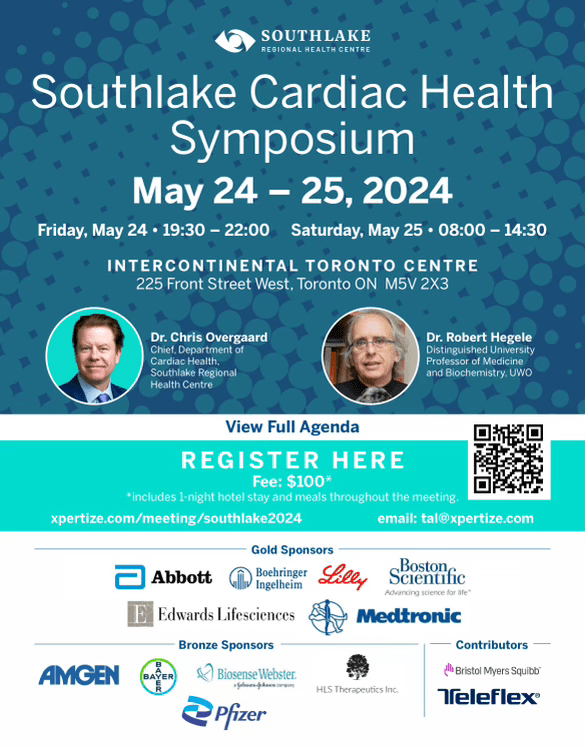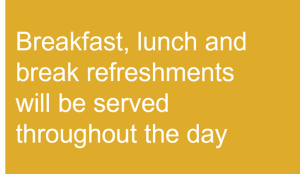OAC Information Webinar – Wednesday, June 19, 2024 at 8:00pm
The next OAC Information Webinar will be held on Wednesday, June 19, 2024 at 8:00pm, via GoTo Webinar. OAC Board members will provide updates on the following topics:
- 2024 PSA Year 1 arbitration process
- OMA Section on Cardiology executive
- Income relativity
- Government funding for NP testing in the community
- Renewed OAC-Lantheus pricing agreement
- 2024 Cardiology Clinical Practice & Financial Management Seminar follow-up
To register your attendance, click: https://attendee.gotowebinar.com/register/4627604087485155161.
After registering, you will receive a confirmation email containing information about joining the webinar.
We hope you can join us. If you have any questions that you would like addressed during the webinar, please send them to us at: [email protected].
Sincerely,
Tim Holman, Executive Director
Ontario Association of Cardiologists
410 – 250A Eglinton Ave. East
Toronto, Ontario M4P 1K2
Tel: 416-487-0054
Toll-free: 1-877-504-1239
Email: [email protected]
Web: www.ontarioheartdoctors.ca
Southlake Cardiac Health Symposium: May 24 – 25, 2024
This program has been designed to educate practitioners providing care to the cardiology patient from the Greater Toronto Area on contemporary cardiology topics, along with showcasing the services offered by Southlake Regional Hospital.
The event will commence with a Welcome Reception on Friday, May 24, followed by scientific sessions running until 14:30 on Saturday, May 25. For more information and registration details, click here: https://www.xpertize.com/meeting/southlake2024/.

OAC 2024 Cardiology Clinical Practice & Financial Management Seminar – Registration Now Open

The OAC’s 2024 Cardiology Clinical Practice & Financial Management Seminar will be held on Saturday, April 13, 2024 at Li Ka Shing Knowledge Institute in Toronto, Ontario.
The impressive line-up of topics and speakers includes:
TOPICS
Roundtable Discussion: Establishing and managing a successful cardiology practice
(OAC Board members)
Incorporating technology in your practice
(Dr. Mukesh Bhargava, Northumberland Hills Hospital)
Mapping your financial future: tax strategies, investments, and retirement options
(Mr. Amin Kanji, CIBC Private Wealth/Mr. Andrew Pyle, CIBC Wood Gundy)
Tips and advice for building wealth and achieving your long-term financial goals
(Ms. Deanna Cregg, Baker Tilly KDN LLP/Mr. Gary Kaye, GPK Advisory Services Inc.)
Navigating challenging clinical encounters with patients and families
(Dr. Evelyn Constantin, CMPA Advisor)
OHIP billing audits and CPSO complaints/investigations: The Joy of It All – Not
(Mr. Neil Abramson, Torkin Manes LLP)
Practice management and business support solutions
(Mr. Michael Black, Specialty Medical Partners)
Opportunities and investment landscape in India
(Mr. Vikash Sharma, ICICI Bank Canada)

To register CLICK HERE or scan the QR code below:

Scan to register
Sponsored By:

For more information, please contact:
Ontario Association of Cardiologists
410 – 250A Eglinton Ave. East
Toronto, Ontario M4P 1K2
Tel: 416-487-0054
Toll-Free: 1-877-504-1239
E-mail:[email protected]
Web: www.ontarioheartdoctors.ca
2024 Budget: Recommendations for Enhancing Cardiac Patient Care in Ontario

Following up on its pre-budget consultations presentation to the Standing Committee on Finance and Economic Affairs last week, the Ontario Association of Cardiologists welcomed the opportunity to provide the Ontario government with fiscal recommendations for enhancing cardiac patient care in the 2024 Ontario Budget through its written submission to the committee.
Our recommendations include:
- Increase support for Ontario’s infrastructure for outpatient cardiac care in general and, in particular, improved support for independent outpatient facilities that provide consultations and follow up care for cardiac patients and for which there is no other external support to maintain the infrastructure (rent, capital expenses and staffing) to support these patient visits.
- Provide permanent funding for Natriuretic Peptide testing in community laboratories for patients with suspected or established congestive heart failure.
- Remove restrictions on telephone-based care that negatively impact seniors, patients with limited economic resources, and those who live in rural and remote parts of the province without access to video conferencing facilities.
We look forward to working with the provincial government to implement these recommendations in 2024.
Click here to read the OAC’s 2024 Ontario Budget submission.
For more information, contact:
Tim Holman, Executive Director
Ontario Association of Cardiologists
410 – 250A Eglinton Ave. East
Toronto, Ontario M4P 1K2
Tel: 416-487-0054
Toll-Free: 1-877-504-1239
E-mail: [email protected]
Web: www.ontarioheartdoctors.ca
OAC at 2024 International Arrhythmia School – February 9-11, 2024 (Collingwood, ON)
The OAC is presenting at the 2024 International Arrhythmia School in Collingwood, Ontario on February 10th, 2024. The session will focus on the Association’s recent achievements and advocacy priorities for this year.
More details on the conference, which runs from Feb. 9 – 11th, can be found here: https://acrobat.adobe.com/id/urn:aaid:sc:US:9b8f9f84-739c-466a-9d49-25fd8cbaeb05
OAC members receive a special discount. Email [email protected] to receive your personal discount code.
For more information, contact:
Tim Holman, Executive Director
Ontario Association of Cardiologists
410 – 250A Eglinton Ave. East
Toronto, Ontario M4P 1K2
Tel: 416-487-0054
E-mail: [email protected]
Web: www.ontarioheartdoctors.ca
Winter/Spring 2024 Webinar Schedule
The OAC will host the following information webinars for members during the winter/spring 2024. These meetings will be held on:
- Wednesday, January 24, 2024 at 8:00pm. Registration link: https://attendee.gotowebinar.com/register/2807703433561883221
- Wednesday, February 28, 2024 at 8:00pm. Registration link: https://attendee.gotowebinar.com/register/5348852926235982424
- Wednesday, March 27, 2024 at 8:00pm. Registration link: https://attendee.gotowebinar.com/register/8546751709297080671
- Wednesday, April 24, 2024 at 8:00pm. Registration link: https://attendee.gotowebinar.com/register/7974839636597825376
We invite all OAC members to join us to learn more about the Association’s advocacy initiatives and provide feedback on our activities.
For more information, please contact the OAC office at:
Ontario Association of Cardiologists
410 – 250A Eglinton Ave. East
Toronto, ON M4P 1K2
Tel: 416-487-0054
Toll-Free: 1-877-504-1239
E-mail: [email protected]
Web: www.ontarioheartdoctors.ca
2024 Cardiology Clinical Practice & Financial Management Seminar – Saturday, April 13, 2024
The OAC is holding its inaugural Cardiology Clinical Practice & Financial Management Seminar designed to educate, engage, and empower members of Ontario’s cardiology profession to navigate through issues and opportunities at various career stages from opening, to managing, to winding down their medical practice.
Attendees will hear from OAC Board members and outside financial, accounting, and legal experts who will offer valuable advice for running a successful practice and achieving your professional and personal financial objectives.
Saturday, April 13, 2024
Li Ka Shing Knowledge Institute
Toronto, ON
Mark your calendars and stay tuned for registration details!
For more information, contact:
Tim Holman, Executive Director
Ontario Association of Cardiologists
Tel: 416-487-0054
E-mail: [email protected]
OAC Supports Permanent Government Funding for Natriuretic Peptide Testing Performed in Community Laboratories
Today, the OAC expressed its support for permanent government funding for natriuretic peptide testing performed in community laboratories in the following letter to Ontario’s Minister of Health, the Hon. Sylvia Jones. We look forward to the provincial government acting on this important priority in the 2024 Ontario Budget.
November 27, 2023
Hon. Sylvia Jones, MPP
Minister of Health
College Park, 5th Floor
777 Bay Street
Toronto, ON M7A 2J3
Re: Permanent Funding for Natriuretic Peptide Testing in Community Laboratories
Dear Minister:
On behalf of the Ontario Association of Cardiologists (OAC), I am writing to urge the Ministry of Health to provide permanent funding for natriuretic peptide (NP) testing performed in community laboratories when clinically indicated on patients with suspected heart failure.
In November 2021, the Ministry of Health created the Community Access Pilot for Laboratory Services through which it funded the cost of NP testing when performed by a community laboratory on patients with suspected heart failure. The OAC enthusiastically supported this pilot project at the time and welcomed its subsequent extension for the 2022-23 and 2023-24 fiscal years. As the end of the 2023-24 fiscal year approaches, we strongly recommend the Ministry provide permanent funding for NP testing in Ontario community laboratories starting April 1, 2024.
The clinical evidence supporting the use of NP testing is unequivocal. These screening tests are extremely beneficial in aiding early heart failure diagnoses and ensuring timely treatment. This is good for patients and reduces the overall burden of heart failure on Ontario’s health care system. Over the past two years, Ontario’s heart failure specialists and patients have embraced improved community access to this important diagnostic and therapeutic decision-making tool. Making public funding permanent will provide stability and enable better long-term management of heart failure in both primary and specialty care settings.
As medical specialists with in-depth expertise and experience in managing heart failure patients, Ontario’s cardiologists agree with the need to ensure that NP testing is used only when appropriate. Consequently, we offer to work with stakeholders to develop and communicate guidelines for its use by health care providers in all clinical settings.
The Ontario government demonstrated strong leadership two years ago by including NP testing in the Community Access Pilot for Laboratory Services. We urge the Ministry to take the next step and make NP testing funding permanent in Ontario starting April 1, 2024.
Sincerely,
John D. Parker, MD, FRCPC
Board Member
c.c. Dr. Andrew Park, President, OMA
Dr. Lesley James, Director, Health Policy and Systems (Ontario), Heart and Stroke
For more information, contact:
Tim Holman, Executive Director
Ontario Association of Cardiologists
Tel: 416-487-0054
Toll-free: 1-877-504-1239
Email: [email protected]
2023 Annual General Meeting – Wednesday, September 27, 2023 at 8:00pm
The OAC is holding the 2023 annual general meeting for members on Wednesday, September 27, 2023 at 8:00pm for the following purposes:
- to approve the minutes of the previous members’ meeting (September 28, 2022);
- to approve the financial statements of the Corporation for the year ended June 30, 2023;
- to confirm the directors of the Corporation;
- to appoint the accountants and authorize the directors to fix their remuneration;
- to transact such further and other business as may properly come before the meeting or any adjournment or adjournments thereof.
In addition to the above, the following items will be addressed on the agenda:
- Board Report
- Membership Update
- 2021 Physician Services Agreement – Year 3 Allocation Process
- 2024 Physician Services Agreement – Cardiology’s Negotiations Priorities
- PIPEDA Appeal – Opposition to OMA study involving StatsCan and CRA data
- EQI Program
- Other Initiatives
- New Business
- Adjournment
OAC members may register their attendance by clicking here: https://attendee.gotowebinar.com/register/6248647059047925850.
Members who are not able to be present are requested to sign, date and return the proxy form electronically to [email protected].
If you have any questions or comments, please contact the OAC office at:
Ontario Association of Cardiologists
410 – 250A Eglinton Ave. East
Toronto, Ontario M4P 1K2
Tel: 416-487-0054
Toll-Free: 1-877-504-1239
E-mail: [email protected]
Fall 2023 Information Webinar Schedule
The OAC has announced it will host two Information Webinars this fall. These members-only meetings will be held on:
- Wednesday, September 27, 2023 at 8:00pm. Note: This will also be the 2023 OAC Annual Meeting. For more details, please consult the Official Notice. Registration link: https://attendee.gotowebinar.com/register/6248647059047925850
- Wednesday, November 29, 2023 at 8:00pm. Registration link: https://attendee.gotowebinar.com/register/4677780294002607960
We invite all OAC members to join us for these meetings to learn more about the Association’s advocacy initiatives and provide feedback on our activities.
For more information, please contact the OAC office at:
Ontario Association of Cardiologists
410 – 250A Eglinton Ave. East
Toronto, ON M4P 1K2
Tel: 416-487-0054
Toll-Free: 1-877-504-1239
E-mail: [email protected]
Web: www.ontarioheartdoctors.ca
OAC Information Webinar – Wednesday, June 7, 2023 at 8:00pm
The next event in the OAC’s 2023 Monthly Update Webinar Series will be held on Wednesday, June 7, 2023 at 8:00pm.
Join us to receive updates on the OAC’s advocacy initiatives this spring and summer.
To register your attendance for the webinar, click here: https://attendee.gotowebinar.com/register/1527184698973639002.
Ontario Association of Cardiologists
410 – 250 Eglinton Ave. East
Toronto, ON M4P 1K2
Tel: 416-487-0054
Toll-Free: 1-877-504-1239
E-mail: [email protected]
Web: www.ontarioheartdoctors.ca
OAC Information Webinar – Wednesday, March 29, 2023 at 8:00pm
The next event in the OAC’s 2023 Monthly Update Webinar Series will be held on Wednesday, March 29, 2023 at 8:00pm.
Join us to receive updates on the Association’s advocacy initiatives this spring.
To register your attendance for the webinar, click here: https://attendee.gotowebinar.com/register/2909426942642716757.
Ontario Association of Cardiologists
34 Eglinton Ave. West, Suite 410
Toronto, ON M4R 2H6
Tel: 416-487-0054
Toll-Free: 1-877-504-1239
E-mail: [email protected]
Web: www.ontarioheartdoctors.ca
2023 Budget: Recommendations for Enhancing Cardiac Patient Care in Ontario
Ontario’s cardiologists welcomed the opportunity to provide the Ontario government with fiscal recommendations for enhancing cardiac patient care in the 2023 Ontario Budget through its submission to the Standing Committee on Finance and Economic Affairs on Tuesday, February 14, 2023.
Our recommendations include:
1. Remove restrictions to telephone-based virtual care for seniors, people on social assistance, and those who live in rural and remote areas of the province that lack access to high-speed internet needed to support the use of video technology. Telephone-based virtual care services should be funded equal to video conferencing and in-person care for these patients.
2. Permanently restore the chronic disease assessment supplement for cardiac specialist treatment and care of heart failure patients in the community beginning April 1, 2023.
3. Sign a bilateral agreement with the federal government to secure new health care funding and use a portion of it to support and improve the delivery of cardiac care through the province’s community-based outpatient clinic infrastructure. The creation of a professional practice expense recovery fee for out-of-hospital ambulatory care in the OHIP Schedule of Benefits is proposed as a mechanism for achieving this objective.
We look forward to working with the provincial government to implement these ideas in 2023.
Click here to read the OAC’s 2023 Ontario Budget submission.
For more information, contact:
Tim Holman, Executive Director
Ontario Association of Cardiologists
Tel: 416-487-0054
E-mail: [email protected]
OAC Information Webinar: Wednesday, January 25, 2023 at 8:00pm
The next event in the OAC’s 2023 Monthly Update Webinar Series will be held on Wednesday, January 25, 2023 at 8:00pm.
Join us to receive updates on various initiatives including the EQI Program, virtual care advocacy and more.
To register your attendance for the webinar, click here: https://attendee.gotowebinar.com/register/748133428581186649.
Ontario Association of Cardiologists
34 Eglinton Ave. West, Suite 410
Toronto, ON M4R 2H6
Tel: 416-487-0054
Toll-Free: 1-877-504-1239
E-mail: [email protected]
Web: www.ontarioheartdoctors.ca
OHIP INFOBulletin: Virtual Health Care in Ontario
The Ministry of Health issued an OHIP INFOBulletin today outlining the details of Ontario’s virtual care framework implemented on December 1, 2022.
The INFOBulletin can also be accessed here: OHIP Bulletin- Virtual Care (December 2022)
The OAC continues to advocate for exemptions to the virtual care framework to permit better access to telephone-based virtual care services for those who do not or cannot use video conferencing technology (e.g. many seniors) and/or do not have access to high speed internet that is needed to deliver video-based virtual care.
For more information, contact:
Tim Holman, Executive Director
Ontario Association of Cardiologists
34 Eglinton Ave. West, Suite 410
Toronto, ON M4R 2H6
Tel: 416-487-0054
Toll-Free: 1-877-504-1239
E-mail: [email protected]
Web: www.ontarioheartdoctors.ca
Ontario Seniors and Rural Patients Will Be Hurt By New Virtual Care Rules
Cardiologists say Doug Ford Government Must Make Changes Before December 1st Deadline
TORONTO, Nov. 17, 2022 /CNW/ – Ontario cardiologists are appealing to the Ontario government to make changes to new rules that will govern the delivery of virtual care services across the province starting December 1, 2022.
The new rules prohibit or cut funding for virtual care services that cardiac patients have been able to receive by telephone for the past two-and-a-half years. Specifically, virtual consultations on new patients will only be allowed if provided by video conferencing (e.g. Zoom). Furthermore, funding for follow-up virtual patient visits provided by telephone will be cut. These restrictions will affect many Ontario seniors and rural patients, who either do not use video technology or are unable to use it because of a lack of high-speed internet, and will force them to go to their cardiologist’s office to receive these services.
“We are very concerned about elderly patients who don’t use computers and those without internet access who will once again have to travel long distances to see a specialist,” said Dr. Richard Davies, Vice Chair of the OMA Section on Cardiology and Board Member of the Ontario Association of Cardiologists. “With COVID cases expected to rise this winter, patients may be anxious about going into a busy cardiologist’s office. Unnecessary travel is also difficult and time consuming for them and their family members who often must accompany them.”
Since the onset of the pandemic, patients have embraced telephone virtual care services. Cardiologists use telephone virtual care for appropriate patients for whom video conferencing does not work. This can occur because of a lack of sufficient internet bandwidth, or because the patient is simply uncomfortable using the necessary technology. An important lesson cardiologists learned during the pandemic is that medically appropriate, high quality virtual cardiac consultations and follow up visits can be performed successfully by telephone as long as best practice guidelines are followed.
Significant Patient Cost Savings Associated With Virtual Care
Last month, researchers at ICES, Lawson Health Research Institute, and Western University published a study showing that virtual care provided in Ontario during the pandemic was associated with a significant reduction in patient travel-related expenses. For more than 10 million patients with at least one virtual appointment during the study period (63 million visits in total), virtual care was associated with estimated savings of:
- 2 billion kilometres of patient travel; and
- $569 to $733 million in patient expenses for gasoline, parking, or public transit.
Importantly, 91% of the virtual patient visits done during the study were conducted by telephone. With the new virtual care rules that restrict telephone patient visits coming into effect on December 1st, patient costs associated with accessing care will rise.
“There is no medical, financial, or clinical reason to prohibit new patient visits or reduce funding for follow-up visits provided by telephone. The new rules make it more difficult and more expensive for patients to receive the timely cardiac care they need,” said Dr. Davies. “For the sake of Ontario seniors and rural patients across the province, we call on the Ford government to remove the restrictions on telephone virtual care services contained in the new rules that come into effect on December 1, 2022.”
For further information:
Tim Holman, Executive Director
Ontario Association of Cardiologists
Tel: 416-487-0054
E-mail: [email protected]
